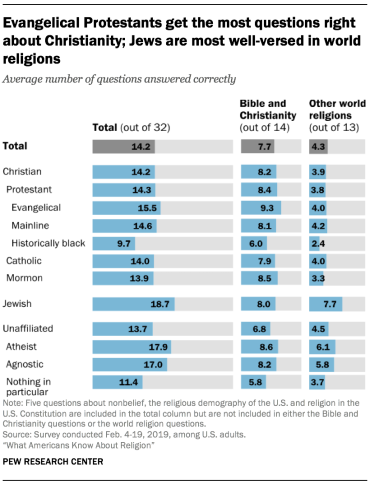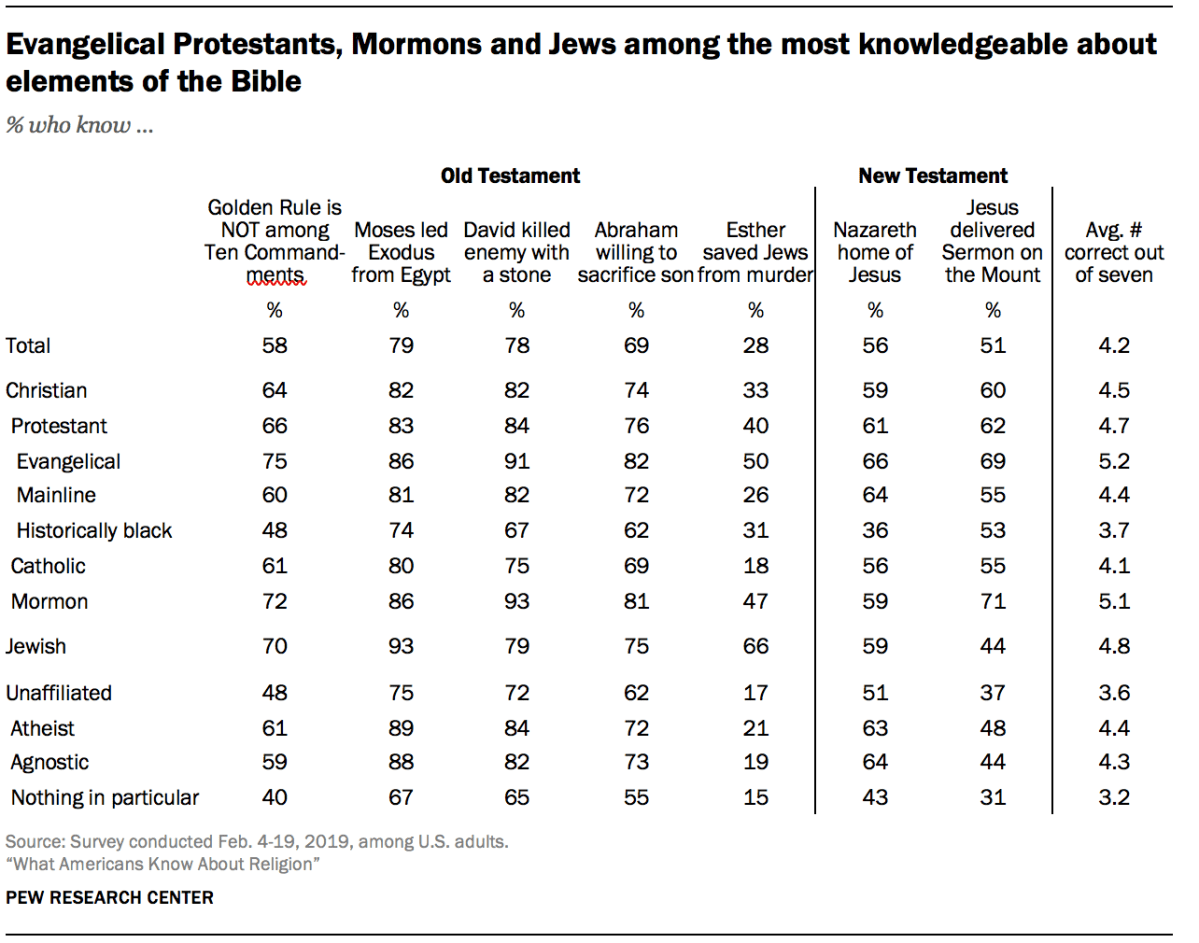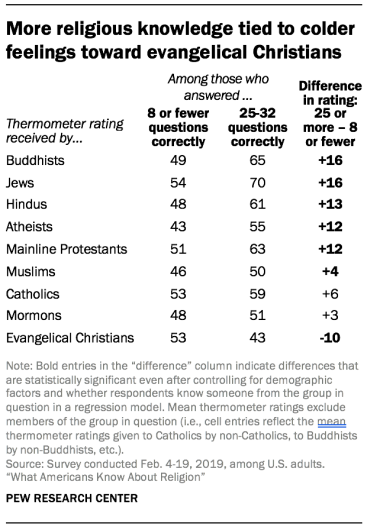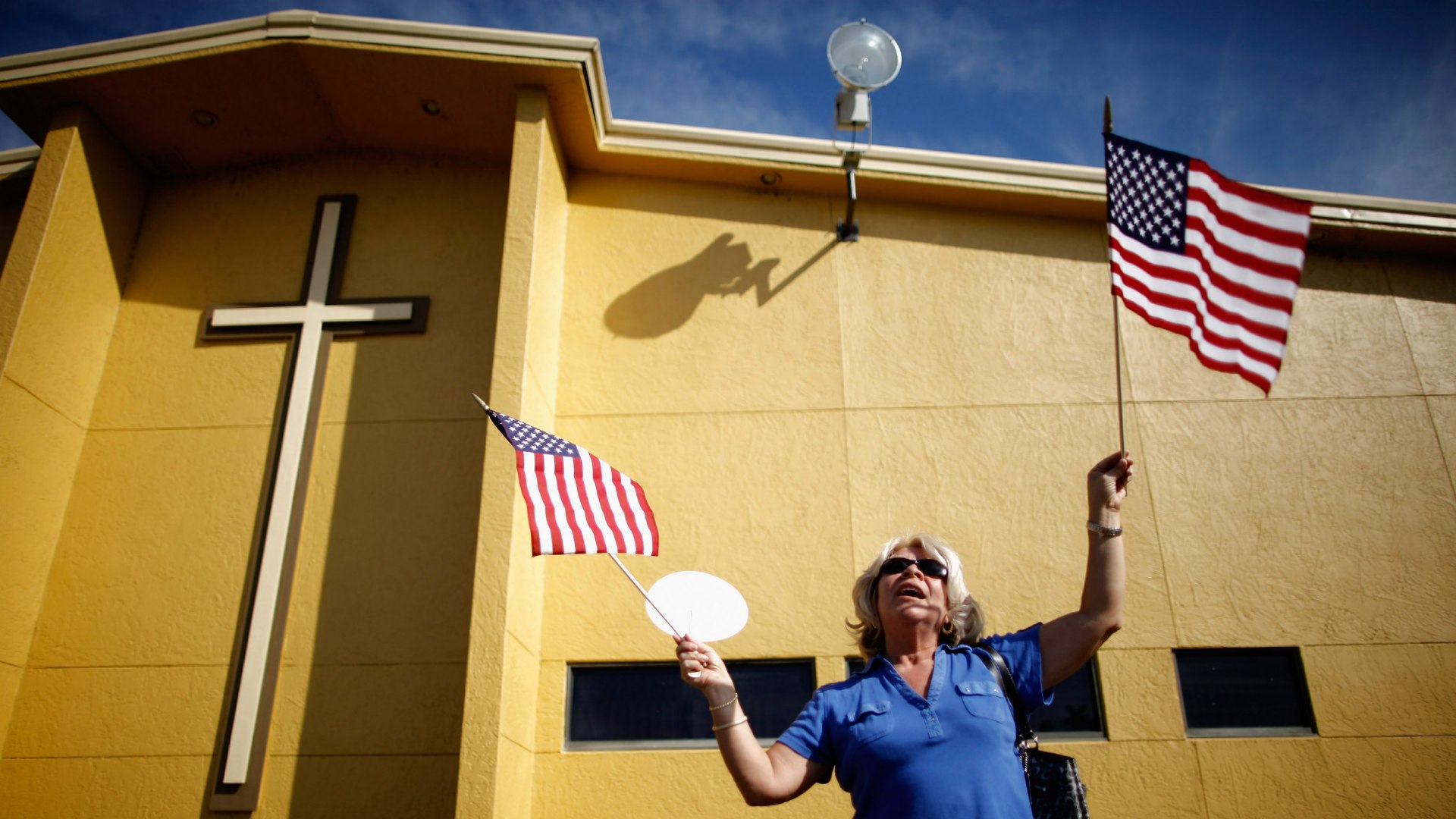There’s an adage that sometimes comes up in the church: “You can’t love what you don’t know.”
Research has shown that people with the greatest understanding of other faiths tend to have more positive views of outside traditions. But a recent survey found one key exception: evangelical Protestants.
The people who know the most about religion—and scored the highest on Pew Research Center’s religious literacy quiz—actually had worse views of evangelicals than the average American or those with low scores.
“Higher scores on the overall (32- point) religious knowledge scale tend to be associated with warmer evaluations of most religious groups,” the researchers wrote. “One exception to this pattern is evangelical Christians, who are rated most warmly by those at the low end of the religious knowledge scale.
Meanwhile, evangelical Protestants actually know more than the average American about religion, due largely to their familiarity with their own faith. While few in the US can parse Protestant theology or define the prosperity gospel, evangelicals were among the top-performing faith groups in a religious literacy quiz, ranking after Jews, atheists, and agnostics and above other Christian affiliations and religious nones.

Evangelicals—in this survey, a multiethnic sample grouped by affiliation—know the Bible and Christianity better than anyone else, but when it comes to other traditions, their standings fall. Only evangelicals who said they regularly dedicated time to learning about world religions knew more than average about other faiths.
The issue of religious literacy matters more than ever in America’s pluralistic context, and evangelicals have been on both sides of mischaracterizations, misunderstandings, and discrimination over religious beliefs.
“It is crucial that evangelicals, both young and old, have accurate understandings of other religions. Insofar as Christians want to be fairly represented, so they need to do the same for others,” said Nijay Gupta, a Portland Seminary professor who has written about New Testament perspectives on interfaith relations. “With social media and other online communication, the world is getting smaller and caricatures of any religion are easily deconstructed and dismissed.”
Scoring above average on Scripture and sola fide
Pew’s 32-question survey included basic questions about religious beliefs and practices; Old and New Testament stories; and religious demographics in the US and globally. Americans answered 14.2 questions right on average (44%), while evangelicals got closer to half, with 15.5 right.
Only around one in five respondents answered the questions about Protestantism correctly—making them among the hardest in the quiz. Around 20 percent of Americans identified Protestants (and not Catholics) as the group that traditionally teaches salvation through faith alone, while 22 percent could define the prosperity gospel as affiliated faith with health and wealth.
Though evangelicals fared the best on this pair of questions, still fewer than half (35% and 37% respectively) got them right. (The State of Theology survey from Ligonier Ministries and LifeWay Research has similarly found that a surprising number of evangelicals affirm heretical beliefs or simply do not know where they stand on certain teachings.)
Among the seven Bible questions, evangelicals scored the highest (5.2), answering over a full question higher than average (4.2). Of the passages in the quiz, the best-known Bible story was David and Goliath, which 91 percent of evangelicals and 72 percent of Americans could identify David as the figure “most closely associated with killing an enemy with a stone.” The least familiar was Esther, whom just half of evangelicals and 28 percent of Americans named as the Old Testament heroine who “saved Jews from murder by appealing to king.”

Knowing other faiths
The scores dropped when it came to the 13 questions about non-Christian faiths and global religion. Evangelicals got just 4 right on average, less than the 4.3 by Americans overall. While most evangelicals knew about Mecca as Islam’s pilgrimage site (59%) and Ramadan as its holy month of fasting (56%), they were far less likely than average to know the core beliefs of minority faiths like Sikhism (34%).
American evangelicals are becoming more interested in understanding other faiths, both as a way to evangelize and to love and serve their diverse neighbors. In the Pew survey, evangelicals who regularly take time to learn about other faiths answered 5.5 of the 13 world religion questions right.
Having a social network that spans faiths also correlates with higher religious literacy. “On average, respondents who know someone from at least seven different religious groups answer 19 questions right, on average, while those who know someone from three or fewer religious groups average 8.6 right.”
Previous Pew surveys have found that white evangelicals are least likely to know a Muslim, but many churches and young evangelicals are intentionally seeking out interfaith and cross-cultural friendships as America grows more diverse.
Today’s evangelical students “often have relatives and friends who are Muslim, Jewish, or Hindu,” said Gupta at Portland Seminary. “They might not be comprehensively well-informed, but because of personal relationships, they want to be respectful.”
Interfaith partnerships used to raise concerns among evangelicals over relativism, or a need for them to put aside their Christian faith to work together. Though those issues can still remain, leaders like John Inazu and Tim Keller have urged the church to embrace pluralism as a context for religious liberty, seeking “common ground even with those who may not share our view of the common good.”
“We as evangelicals ought to remember that the freedom of religion in our country means that others have a right to hold their views as much as we do,” Amos Yong, dean of the School of Theology and School of Intercultural Studies at Fuller Theological Seminary, told CT. “We ought to be less worried that people have convictions (like us), even to the point of defending the rights of people of other faiths to their views, and more concerned that all of us ought hold our convictions in ways that nevertheless enable our respectful interactions and even collaboration with neighbors of other faiths.”
Evangelicals’ reputation
But even as evangelicals grow more open and understanding of other faiths, others’ views of evangelicals have not improved. In a 2017 Pew report, they were the only faith group whose reputation hadn’t warmed up, with fewer than 1 in 3 non-evangelicals viewing evangelical favorably.

In the recent survey, evangelicals were viewed most negatively by the highest scoring respondents of the quiz.
On a temperature scale of warm/favorable to cool/unfavorable, they were rated a low 43 degrees by those who answered 25 or more questions right and a higher 53 degrees by those who answered 8 or fewer right.
This goes against the general finding that “respondents who are highly knowledgeable about a religious group tend to express relatively warm feelings toward that group.” One explanation: Atheists and agnostics, who outperform evangelicals and all other faiths except Jews on the quiz, likely make up a significant portion of the high scorers.
“The popular notion, in the public at large but also among evangelicals themselves, is that evangelicals are rather convinced about their being ‘right’ and other religionists being ‘wrong,’and from this perspective, it is surely understandable that those who feel like they are being labeled as wrong would tend to view the (evangelical) labelers unfavorably,” said Yong at Fuller. “I’d be less concerned about improving reputation for its own sake, but for the sake of the gospel.”
Anyone can take Pew’s religious literacy quiz here. Fewer than 1 percent of respondents earned a perfect score.












